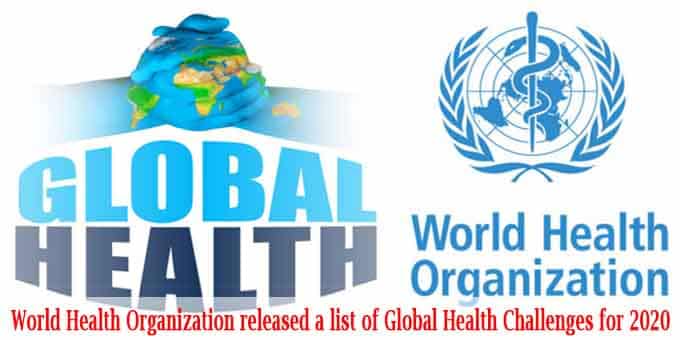On January 14, 2020 the World Health Organisation(WHO) released the Global challenges for 2020. 13 health challenges in this decade were also identified. The release in detail are as follows: Global health challenges for 2020:
Global health challenges for 2020:
i.Top global challenges: Antimicrobial resistance (AMR), climate crisis, eventuality of an influenza epidemic and spread of infectious diseases such as malaria, HIV (Human immunodeficiency virus) and tuberculosis (TB) were listed as the top global health challenges for 2020.
- It is also the second straight year that these challenges have topped the WHO list.
ii.13 challenges: The 13 global challenges are addressing climate crisis; delivering health amid conflict; fighting health care inequality; expanding access to medicines; stopping infectious diseases; preparing for epidemics; guarding against dangerous products; investing in health workers; Protecting the world’s youth; gaining public trust; harnessing new technologies; Protecting lifesaving medicines and finally keeping health care clean.
General Findings:
i.Lack of access: The main reason for these 13 potential threats were lack of medical access. Nearly 1/3rd of the people globally lack access to medicines, vaccines, and various other health products which act as the 2nd largest expenditure for most health systems.
- Medicines and other health products are also the largest component of private health expenditure in low- and middle-income countries.
ii.Healthcare conflicts: Providing healthcare in conflict ridden areas remained as the biggest challenges globally. WHO recorded 978 attacks on healthcare personnel in 11 countries in 2019 alone. It also led to death of 193 health workers.
- Increase in attack: The increase in attack on healthcare personnel was pronounced in the ongoing Ebola in the Democratic Republic of Congo (DRC), as well as Measles disease outbreak. Nearly 390 attacks took place in DRC alone in August 2018.
iii.Need of health workers: The world will be in need of 18 million additional health workers by 2030 that also includes 9 million nurses and midwives.
iv.Air pollution: 7million people are being killed every year due to Air pollution.
v.Food habits: Lack of food, unsafe food and unhealthy diets are responsible for 1/3rd of global disease burden currently.
vi.HAIs: Healthcare associated infections (HAIs) also prevails globally. 1 in 4 health facilities globally lack basic water services like lack of water, sanitation and hygiene.
vii.AMR: Antimicrobial Resistance, i.e, AMR prevails as a repeated offender. Factors that lead to AMR included unregulated prescription and use of antibiotics, lack of access to quality and affordable medicines, etc.
New Guidelines named “Helping Adolescents Thrive” for adolescents:
i.Adolescents health challenges: More than 1 million adolescents aged between 10 and 19 years of age die annually due to road injury, HIV, suicide, respiratory infections etc.
ii.The WHO in 2020 will issue new guidelines for policy makers, health practitioners and educators, called Helping Adolescents Thrive.
iii.Aim: The aim of the guideline is to promote adolescents’ mental health and prevent the use of drugs, alcohol, self-harm and interpersonal violence etc. The guideline will also provide information about prevention of HIV & other sexually-transmitted infections, contraception, and care during pregnancy and childbirth
About World Health Organisation(WHO):
Founded- 7 April 1948.
Headquarters- Geneva, Switzerland.
Director General- Tedros Adhanom Ghebreyesus.
Fact- World health day is celebrated annually on April 7th.




